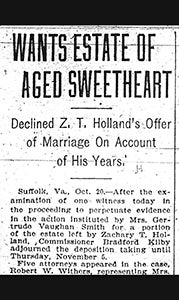The murder of Grac Jones: Chapter 4
Published 8:41 pm Wednesday, July 29, 2015
The lawsuit
EDITOR’S NOTE: On the evening of Oct. 26, 1908, five shots rang out in the village of Holland. Tiberius Gracchus “Grac” Jones lay dying on the ground inside the gate leading to his home. “They have killed me and killed me for telling the truth,” he told a friend as his life ebbed away. This is the fourth in a series of articles about the Jones murder case. Suffolk historian Kermit Hobbs Jr. compiled the 18-part series from personal accounts, newspaper stories and court records he has studied from the period.
By Kermit Hobbs Jr.
On Feb. 8, 1908, the day after Zach Holland’s funeral and burial, a professional safecracker was brought in from Norfolk to open Mr. Holland’s safe. There was much excitement among the many family members who potentially stood to inherit a great deal of money.

This newspaper clipping from 1908 gives an account of legal proceedings related to the disputed will of Zach Holland.
Among those family members were Gus Holland, Joseph Holland, and I.A. Luke, sons and son-in-law of William Holland, the brother Zach had sworn would never see a penny of his money. These were the three men who, according to Grac Jones, were responsible for destroying the will that left the majority of the estate to Gertrude Vaughan. Jones claimed he had gotten this information from Sam Hardy.
Opening the safe took hours of drilling, until finally around midnight the safe was opened. The observers were awestruck to see that it contained approximately $65,000 in bills, bonds, and cigar boxes full of gold and silver coins. In addition, there were shares of stock and bank books from several banks showing substantial balances. These items, plus Holland’s real estate, were estimated to bring his fortune close to $100,000. In today’s values, this would amount to well over $2 million.
But there was no will.
Judge R.H. Rawles was named as administrator of the Zach Holland estate, and each of nine heirs, from William Holland’s and Catharan Holland Luke’s descendants, would receive one-tenth. Two children would each receive one-twentieth.
Gertie Vaughan Smith and her new husband, Jack Smith, carefully observed the events concerning the will and the planned disposition of the estate. Knowing the “true” history of the will, they hired a Suffolk attorney, R.W. Withers, to establish the lost or destroyed will and to see that the estate went to Gertrude as, in their opinion, Zach Holland had clearly wished.
Eventually, the Smiths would be awarded $5,000 in settlement for their claim.
Grac Jones was still incensed at Sam Hardy’s allegation that he had lied about Zach Holland’s will being destroyed, and his anger escalated to a level of obsession. He joined with the Smiths in their lawsuit against Hardy, and his word was the strongest evidence that Withers had to prove their case against Hardy.
To Jones, it was a matter of vindicating his own name, and he made it known to everyone that he would pay a thousand dollars to accomplish it.
The heirs hired a panel of four prominent attorneys, Judge R.H. Rawles, Senator E.E. Holland, Commonwealth’s Attorney James U. Burgess, and Seth Edward Everett, to represent them in the will case. Depositions were taken in the case Oct. 20, 1908, but no evidence was uncovered beyond the conflicting claims of the two parties.
Jones now added a new accusation against Hardy — that he was selling liquor without a license. He engaged attorney Withers to bring a new lawsuit against him. To gather evidence against Hardy in this case, Jones hired a private investigator from Norfolk to come to Holland to find evidence to support his claim. But after three days of snooping around the town, the investigator found nothing amiss.
Not only was Grac Jones smarting from Sam Hardy’s accusation of his lying, but also now Hardy was feeling the sting of Jones’ venom. Hardy was just as sensitive of his reputation in the community as Jones was about his. He knew about the private investigator, and he began to make rash statements about Grac Jones.
Hardy was heard by a number of people saying that if Jones came into his store he would kill him. Hardy even sent a messenger to Jones to relay that very threat.
His words would come back to haunt him.






